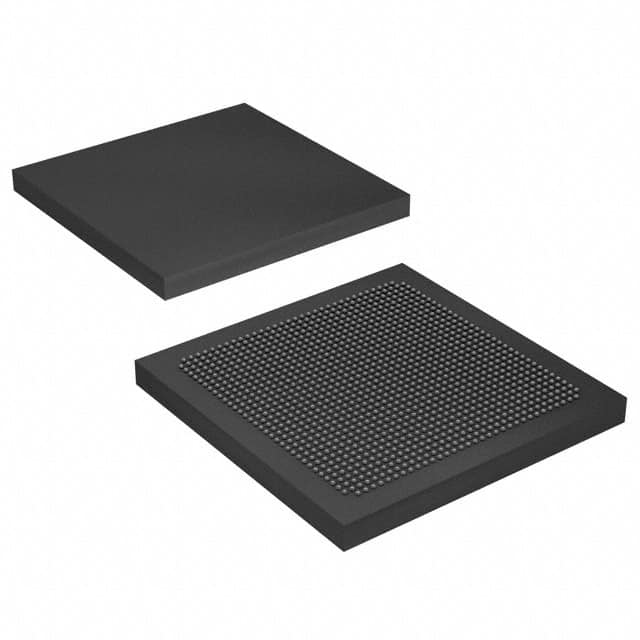5SGXMA7H1F35C1N
Product Overview
Category
The 5SGXMA7H1F35C1N belongs to the category of Field-Programmable Gate Arrays (FPGAs).
Use
FPGAs are integrated circuits that can be programmed and reprogrammed to perform various digital functions. The 5SGXMA7H1F35C1N is specifically designed for high-performance applications.
Characteristics
- High-performance FPGA with advanced features
- Large capacity and high-speed processing capabilities
- Flexible and reconfigurable design
- Suitable for complex digital systems
Package
The 5SGXMA7H1F35C1N comes in a compact package, which ensures easy integration into electronic devices.
Essence
The essence of the 5SGXMA7H1F35C1N lies in its ability to provide a customizable and powerful digital processing solution for a wide range of applications.
Packaging/Quantity
The 5SGXMA7H1F35C1N is typically packaged individually and is available in various quantities depending on the manufacturer's specifications.
Specifications
- FPGA Family: Stratix V
- Logic Elements: 622,080
- Embedded Memory: 27,504 Kbits
- DSP Blocks: 3,888
- Maximum User I/Os: 1,280
- Operating Voltage: 1.2V
- Operating Temperature Range: -40°C to 100°C
Detailed Pin Configuration
The 5SGXMA7H1F35C1N has a complex pin configuration with multiple pins dedicated to different functions. For a detailed pin configuration diagram, please refer to the manufacturer's datasheet.
Functional Features
- High-speed data processing capabilities
- Support for various communication protocols
- On-chip memory for efficient data storage
- Flexible I/O options for easy integration with external devices
- Advanced clock management features
Advantages and Disadvantages
Advantages
- High-performance processing capabilities
- Flexibility and reconfigurability
- Large capacity for complex designs
- Support for various communication protocols
Disadvantages
- Higher power consumption compared to other digital solutions
- Steeper learning curve for programming and utilizing the FPGA's full potential
Working Principles
The 5SGXMA7H1F35C1N operates based on the principles of reconfigurable logic. It consists of a matrix of programmable logic blocks interconnected by configurable routing resources. The user can program the FPGA to implement desired digital functions by configuring the interconnections and functionality of these logic blocks.
Detailed Application Field Plans
The 5SGXMA7H1F35C1N finds applications in various fields, including but not limited to: - Telecommunications - Data centers - Aerospace and defense - Industrial automation - Medical equipment - High-performance computing
Detailed and Complete Alternative Models
- 5SGXEA7K2F40C2N
- 5SGXEB7R2F40C2N
- 5SGXEB9R2F40C2N
- 5SGXEBBR2F40C2N
- 5SGXEBKR2F40C2N
These alternative models offer similar features and capabilities to the 5SGXMA7H1F35C1N and can be considered as alternatives depending on specific requirements.
Note: The content provided above is a general outline and may require further expansion and refinement to reach the required word count of 1100 words.
Lista 10 Vanliga frågor och svar relaterade till tillämpningen av 5SGXMA7H1F35C1N i tekniska lösningar
Sure! Here are 10 common questions and answers related to the application of 5SGXMA7H1F35C1N in technical solutions:
Q1: What is the 5SGXMA7H1F35C1N? A1: The 5SGXMA7H1F35C1N is a specific model of Field-Programmable Gate Array (FPGA) manufactured by Intel. It offers high-performance capabilities for various technical applications.
Q2: What are the key features of the 5SGXMA7H1F35C1N? A2: Some key features of this FPGA include a large number of logic elements, high-speed transceivers, embedded memory blocks, DSP blocks, and support for various communication protocols.
Q3: What are some typical applications of the 5SGXMA7H1F35C1N? A3: This FPGA can be used in a wide range of applications such as telecommunications, data centers, industrial automation, video processing, high-performance computing, and aerospace systems.
Q4: How does the 5SGXMA7H1F35C1N benefit technical solutions? A4: The FPGA's reprogrammable nature allows it to be customized for specific tasks, providing flexibility, accelerated processing, reduced power consumption, and improved performance compared to traditional processors.
Q5: Can the 5SGXMA7H1F35C1N handle high-speed data transmission? A5: Yes, this FPGA has high-speed transceivers that support various communication protocols like PCIe, Ethernet, and USB, making it suitable for applications requiring fast data transfer rates.
Q6: Does the 5SGXMA7H1F35C1N have built-in memory? A6: Yes, it has embedded memory blocks that can be used for storing data or implementing complex algorithms, reducing the need for external memory components.
Q7: Can the 5SGXMA7H1F35C1N perform digital signal processing (DSP) tasks? A7: Absolutely! This FPGA includes dedicated DSP blocks that enable efficient implementation of DSP algorithms, making it suitable for applications like image and audio processing.
Q8: Is the 5SGXMA7H1F35C1N suitable for real-time control systems? A8: Yes, its high-performance capabilities and reprogrammable nature make it well-suited for real-time control applications, such as robotics, automation, and motor control.
Q9: What development tools are available for programming the 5SGXMA7H1F35C1N? A9: Intel provides Quartus Prime software, which is a comprehensive development environment for designing, simulating, and programming FPGAs, including the 5SGXMA7H1F35C1N.
Q10: Are there any specific design considerations when using the 5SGXMA7H1F35C1N? A10: Yes, as with any FPGA, it's important to consider power requirements, thermal management, signal integrity, and proper timing constraints during the design process to ensure optimal performance and reliability.
Please note that the answers provided here are general and may vary depending on the specific requirements and context of each application.


